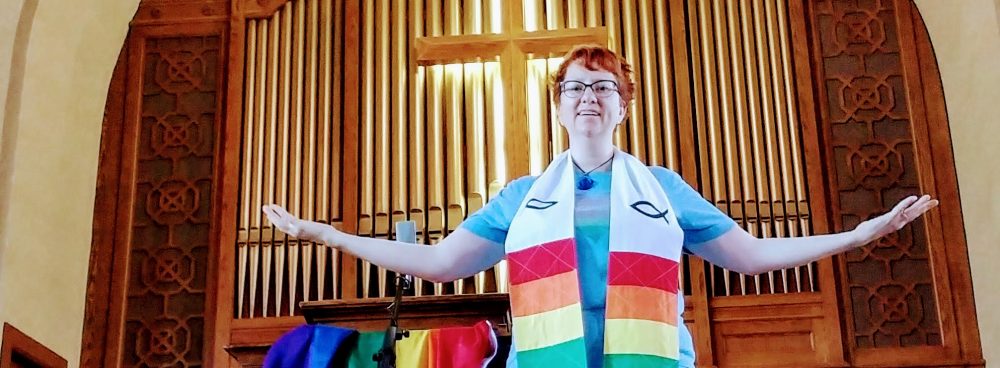The woman at the well is one of my favorite stories. We find it in John 4:5-42.
So, Jesus didn’t have to go through Samaria as he was traveling from Judea to Galilee. The Jewish and Samaritan communities didn’t mix and there was long-standing animosity. One of the main points of contention was about where to worship. The Jewish community had rebuilt the temple in Jerusalem. The Samaritans had built a temple on Mount Gerizim. The final straw in this animosity came about when John Hyrcanus, the Jewish high priest, and ruler, destroyed the Samarian capital, Shechem, and the Samaritan temple. This happened about 130 years before Jesus’ time.
To make the journey Jesus made in this story, most Jews would have traveled to the East, crossed the Jordan River traveled north, then crossed the river back into Galilee in order to avoid Samaria. Jesus just goes straight North. The story tells us that Jesus had to travel through Samaria. He didn’t have to, but he chose to go that way. He made a choice to travel through an area avoided by most of his community. He made a choice to travel through an area that was potentially dangerous.
As they travel, Jesus becomes tired and sits down by a well. He sends the disciples off to find food. Jesus is sitting all alone in an area considered unsafe for his people. A woman arrives at the well to draw water and Jesus strikes up a conversation with her. This is the longest conversation Jesus has anywhere in the scriptures.
Give me a drink! – a demanding tone from Jesus.
And then the woman responds: You’re asking me, an unclean, enemy woman for a drink. I don’t think so.
According to custom, Jesus and the woman could not have shared food, drink, cups, or utensils. Even if she was willing to help Jesus out, he should not have even asked for her assistance.
Jesus responds to her again. “If you knew the gift of God, and who it is that is saying to you, “Give me a drink”, you would have asked him, and he would have given you living water.”
Jesus is talking in riddles and she takes him at face value: “you have no bucket, and the well is deep. Where do you get that living water? Are you greater than our ancestor Jacob, who gave us the well?”
What is interesting about her statement is that she is making reference to their shared history. There is this long-standing animosity and yet they share an ancestor in Jacob. It isn’t Jesus who makes the connection to this shared history—she makes the connection.
Jesus and the woman are sitting beside the well that Jacob dug. We might remember Jacob from the book of Genesis, way back at the beginning of our faith story. Jacob is known for tricking his brother Esau out of his birthright. Jacob met his love wife Rachel by a well when she came to draw water. He was tricked into marrying her sister Leah before he was allowed to marry Rachel. Both the Samarians and Jews trace their ancestry back to this family.
The woman, probably older, is worn out from life. She comes every day to this well to haul water. You can imagine the work of maintaining a household without modern conveniences. This woman would love to rest from her labours, but survival requires her to carry on. If Jesus can give her life-giving water so she won’t have to come back to the well—wouldn’t that be a blessing?
As they continue chatting, Jesus tells her to call her husband—that is the right and proper thing to do. And she has to be honest, she doesn’t have a husband to call. Jesus responds by reminding her that she has had five husbands. There’s no judgment here. We don’t know what happened to her husbands. There was a tradition of levirate marriage—if a husband died, the next brother would marry the widow. This served two main purposes. It was supposed to provide an heir to the previous brother and give the widow some security. It is very possible that this woman had been married to all five brothers and that the last one refused to marry her. She would have had no choice in the arrangement. Can you imagine how life might have worn her down? No wonder she wants the life-giving water that Jesus is offering.
And then the conversation takes a deeply theological turn. The woman identifies Jesus as a prophet, and asks Jesus where the proper place to worship is—is it Jerusalem or mount Gerizim? Jesus says it doesn’t matter where you worship but that you worship in spirit and in truth—that you worship with a good heart and that the way you live follows that same spirit. How would this conversation have gone if Jesus had insisted that Jerusalem was the correct place to worship? The woman seems to be trying to figure out whether Jesus is to be trusted. Will he say something transformative, or will he offer her the same entrenched view that she has heard before?
And Jesus does offer something different. He offers her hope for a time when the specific practices of faith will be less important than following where the spirit leads. And the woman hears Jesus’ words and hears them as an affirmation of her faith. She hears them as an affirmation of hope for the future. “I know that messiah is coming.” Messiah meant different things to different groups of people. For the Samaritans, Messiah was a prophet, similar to Moses, who would restore the observance of the law. For the Jewish people, the messiah would be a political leader who would restore the nation.
And Jesus responds: “I am he, the messiah.” This is the only place in the gospel of John where Jesus identifies himself as the messiah. I wonder if Jesus felt more comfortable with this image of messiah, as the restorer of law, rather than that of a political leader. I wonder if this Samaritan woman understood what Jesus was about better than some of the disciples who were following him all over the countryside. Jesus didn’t start out with the intention of founding a new religion. His intention was to restore Judaism back to its core values of being in good relationship with God and with other people.
In a place where he was supposed to find enemies, Jesus found a woman who shared his concerns and values. He found someone who wanted to be faithful to the law of God and to worship in spirit and in truth. He found someone wanting to dig in, to question and debate what it means to be faithful. If Jesus had done the proper thing and avoided Samaria, he would not have encountered this woman.
I wonder how often we avoid going to certain parts of the city, certain events, or activities because we think they are intended for those “others,” people that are not like us. It is easy to get into certain patterns that keep us in our own little bubble. Sometimes, like the people who avoided Samaria, we do this out of fear. Sometimes it is just a habit.
In a world where there is so much divisiveness, we need to take ourselves off the usual path and go into the places we don’t normally go. We might, surprisingly, find common ground—people who share our concerns and values for including and welcoming, supporting people in poverty, working for reconciliation, and caring for the earth.
The woman at the well might have been worn down by life, but the common ground that she and Jesus found, across the divisiveness of their communities and cultures, created a space where streams of life-giving water could flow. Jesus needed the connection as much as she did. He needed someone who understood what he was trying to do. The encounter sparked in her the possibility that life could be different than what it was. This was a mutual connection.
It wasn’t just Jesus and the woman who were a part of this connection. The disciples had to wrestle with their involvement. They were now staying in a community considered unclean. They weren’t supposed to be there and they were certainly not supposed to be eating and drinking together. The people that the woman when and found were also changed by the encounter with Jesus. There was a ripple effect—one person stepping off the path into a place they weren’t “supposed to be” changed individual lives and changed the relationships between people who held longstanding animosity.
What would happen this Lent, if each of us stepped off our normal path, and stepped into a place we weren’t supposed to be. What would happen if we stepped into someone else’s world. Would the life-giving water flow between us? Would that life-giving water bubble over into the world? What would the ripple effect be like?
I invite you to consider where you could step off your normal path and encounter someone you wouldn’t normally meet. See what happens.

